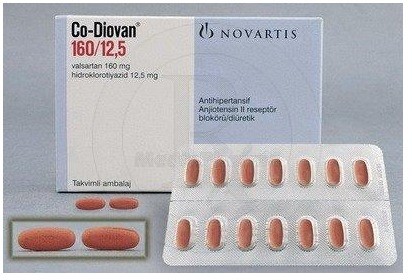
Contents
Diovan HCT (valsartan/hydrochlorothiazide): Side Effects, Warnings, and Drug Interactions
Diovan HCT (valsartan/hydrochlorothiazide) is a combination of an angiotensin receptor blocker (ARB) and a diuretic used to treat high blood pressure (hypertension) and congestive heart failure.
Angiotensin, formed in the blood by angiotensin converting enzyme (ACE), attaches to receptors on smooth muscle cells surrounding blood vessels. This causes the muscles to contract and the blood vessels to narrow, resulting in increased blood pressure.
Valsartan blocks the angiotensin receptor, dilating blood vessels and reducing blood pressure. Hydrochlorothiazide is a diuretic used to treat high blood pressure and edema by blocking salt and water reabsorption in the kidneys, increasing urine output.
Common side effects of Diovan HCT include:
Serious side effects of Diovan HCT include:
- high blood potassium (hyperkalemia),
- impotence,
- reduced renal function,
- allergic reactions,
- rarely, rhabdomyolysis (muscle inflammation and destruction), and
- angioedema (swelling of soft tissues including throat and larynx).
Combining Diovan HCT and lithium increases lithium levels in the body and its side effects, such as increased thirst, decreased heart rate, weakness, blurred vision, decreased concentration, and ringing in the ears.
Use Diovan HCT with caution with nonsteroidal anti-inflammatory drugs (NSAIDs) as they can worsen kidney function and reduce the water removing effects of Diovan HCT.
Diovan HCT is not recommended for pregnant females due to the potential harm to the developing fetus. It is also not recommended for breastfeeding females as it may enter breast milk.
Important Side Effects of Diovan HCT (valsartan/hydrochlorothiazide)
The side effects of valsartan/hydrochlorothiazide are similar to its individual components.
Valsartan is generally well-tolerated. The most common side effects of valsartan include:
Patients may also experience:
- Hyperkalemia (high blood potassium)
- Impotence
- Reduced renal function
- Allergic reactions
Rare but serious side effects of valsartan include rhabdomyolysis and angioedema.
Diovan HCT (valsartan/hydrochlorothiazide) Side Effects for Healthcare Professionals
Clinical Trials Experience
The adverse reaction information from clinical trials provides a basis for identifying drug-related adverse events.
Hypertension
Diovan HCT has been evaluated for safety in over 5700 patients, including over 990 treated for over 6 months, and over 370 for over 1 year. Adverse experiences have generally been mild and transient, rarely requiring discontinuation of therapy. The overall incidence of adverse reactions with Diovan HCT was comparable to placebo.
The overall frequency of adverse reactions was not dose-related nor related to gender, age, or race. Discontinuation of therapy due to side effects was required in 2.3% of valsartan-hydrochlorothiazide patients and 3.1% of placebo patients. The most common reasons for discontinuation of therapy with Diovan HCT were headache and dizziness.
The only adverse reaction that occurred in controlled clinical trials in at least 2% of patients treated with Diovan HCT and at a higher incidence than placebo was nasopharyngitis (2.4% vs. 1.9%).
Dose-related orthostatic effects were seen in fewer than 1% of patients. A doserelated increase in the incidence of dizziness was observed in patients treated with Diovan HCT.
Other adverse reactions reported with valsartan-hydrochlorothiazide (>0.2% of patients in controlled clinical trials) without regard to causality, are listed below:
Cardiovascular: Palpitations and tachycardia
General and Administration Site Conditions: Asthenia, chest pain, fatigue, peripheral edema, and pyrexia
Investigations: Increased blood urea
Nervous System: Postural dizziness, paresthesia, and somnolence
Renal and Urinary: Pollakiuria
Respiratory, Thoracic and Mediastinal: Dyspnea, cough, nasal congestion, pharyngolaryngeal pain, and sinus congestion
Skin and Subcutaneous Tissue: Hyperhidrosis and rash
Other infrequently reported reactions in clinical trials included abnormal vision, anaphylaxis, bronchospasm, constipation, depression, dehydration, decreased libido, dysuria, epistaxis, flushing, gout, increased appetite, muscle weakness, pharyngitis, pruritus, sunburn, syncope, and viral infection.
Initial Therapy – Hypertension
In a clinical study in patients with severe hypertension, the overall pattern of adverse reactions reported through 6 weeks of follow-up was similar in patients treated with Diovan HCT as initial therapy and valsartan as initial therapy.
Comparing the groups treated with Diovan HCT (force-titrated to 320/25 mg) and valsartan (force-titrated to 320 mg), dizziness was observed in 6% and 2% of patients, respectively. Hypotension was observed in 1% of those patients receiving Diovan HCT and 0% of patients receiving valsartan. There were no reported cases of syncope in either treatment group. Laboratory changes with Diovan HCT as initial therapy in patients with severe hypertension were similar to those reported with Diovan HCT in patients with less severe hypertension.
Valsartan: In trials in which valsartan was compared to an ACE inhibitor with or without placebo, the incidence of dry cough was significantly greater in the ACE inhibitor group (7.9%) than in the valsartan groups (2.6% with valsartan alone and 1.5% with placebo). In a trial limited to patients who had previously experienced dry cough with ACE inhibitors, the incidences of cough in patients who received valsartan, hydrochlorothiazide, or lisinopril were 20%, 19%, and 69%, respectively (p
Other infrequently reported reactions in clinical trials included chest pain, syncope, anorexia, vomiting, and angioedema.
Hydrochlorothiazide: Other adverse reactions not listed above that have been reported with hydrochlorothiazide, without regard to causality, are listed below:
Body As A Whole: weakness
Digestive: pancreatitis, jaundice, sialadenitis, cramping, and gastric irritation
Hematologic: aplastic anemia, agranulocytosis, leukopenia, hemolytic anemia, and thrombocytopenia
Hypersensitivity: purpura, photosensitivity, urticaria, necrotizing angiitis, fever, respiratory distress, anaphylactic reactions
Nervous System/Psychiatric: restlessness
Renal: renal failure, renal dysfunction, interstitial nephritis
Skin: erythema multiforme, exfoliative dermatitis
Special Senses: transient blurred vision
Clinical Laboratory Test Findings
In clinical trials, clinically important changes in standard laboratory parameters were rarely associated with administration of Diovan HCT.
Creatinine/Blood Urea Nitrogen (BUN)
Minor elevations in creatinine and BUN occurred in 2% and 15%, respectively, of patients taking Diovan HCT and 0.4% and 6%, respectively, given placebo in controlled clinical trials
Hemoglobin And Hematocrit
Greater than 20% decreases in hemoglobin and hematocrit were observed in less than 0.1% of Diovan HCT patients, compared with 0% in placebo-treated patients
Liver Function Tests
Occasional elevations (greater than 150%) of liver chemistries occurred in Diovan HCT-treated patients
Neutropenia
Neutropenia was observed in 0.1% of patients treated with Diovan HCT and 0.4% of patients treated with placebo
Postmarketing Experience
Additional adverse reactions reported in postmarketing experience include angioedema, elevated liver enzymes, hepatitis, and impaired renal function. Diovan HCT should not be re-administered to patients who have experienced angioedema.
Please consult the full prescribing information for Diovan HCT for more detailed information about side effects, warnings, and drug interactions.


